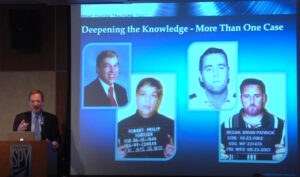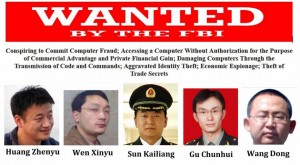
[buzzsprout episode no longer available]
– – – – – – – – –
NSA Whistleblower: The Ultimate Insider Attack (Wired)
When computer security companies release their annual reports about hacking and breaches, they take pains to point out that the insider threat from someone with internal access to data is a far greater risk to a company than an outside hacker.
The more than a million government documents leaked by former Army intelligence analyst Bradley Manning showed this to be true. . .
. . . That’s what makes the leaks by 29-year-old NSA whistleblower Edward Snowden all the more spectacular and alarming — from the NSA’s perspective. The system administrator with the keys to your kingdom, the knowledge of all your secrets and vulnerabilities and the power to control the very operation of your infrastructure, is a far greater threat than anyone else in an organization.
By that measure, Snowden might well be the ultimate inside attacker, since he had not only that rarest of rare views into the core of the intelligence rabbit hole but also the ability to collapse the hole if he’d wanted. . . .
Officials: Edward Snowden took NSA secrets on thumb drive (LA Times)
Former National Security Agency contract employee Edward Snowden used a computer thumb drive to smuggle highly classified documents out of an NSA facility in Hawaii, using a portable digital device supposedly barred inside the cyber spying agency, U.S. officials said.
Investigators “know how many documents he downloaded and what server he took them from,” said one official who would not be named while speaking about the ongoing investigation.
Snowden worked as a system administrator, a technical job that gave him wide access to NSA computer networks and presumably a keen understanding of how those networks are monitored for unauthorized downloads. . . .
– – – –
Sorry, Mr. Obama, the Constitution is not negotiable (Sen. Rand Paul)
In the United States, we are supposed to have a government that is limited with its parameters established by our Constitution. This notion that the federal government can monitor everyone’s phone data is a major departure from how Americans have traditionally viewed the role of government.
If this is acceptable practice, as the White House and many in both parties now say it is, then there are literally no constitutional protections that can be guaranteed anymore to citizens.
In the name of security, say our leaders, the Constitution has become negotiable.. . . .
The Founders warned us (David Keene)
In the midst of all this, my friend and fellow conservative Paul Weyrich was visited by representatives of the Bush Justice Department to see if they could get him to stop complaining about provisions of the Patriot Act he thought were dangerous and to go along with the administration’s push for more and more power.
Paul called me after they left his office and said that their argument boiled down to the fact that while the powers President Bush was seeking were indeed unprecedented, we had to recognize that their motives were good. They were, after all, the good guys and were only seeking these new powers to “protect” us from our enemies.
Paul argued that even if he accepted for the sake of argument that they were, in fact, the good guys, he couldn’t help worrying about what would happen when the less pure of heart had access to these powers in the future. I
told Paul that we should be just as worried about too much power in the hands of good guys, bad guys, Republicans, Democrats or vegetarians.
The Founders devised the safeguards in our Constitution not to protect us from bad guys, but because human beings simply aren’t angels who can be trusted with power over their fellow citizens.
The Founders knew this from their study of history, personal experience and an almost genetic appreciation of the truth of Lord Acton’s warning that power corrupts. They did their level best to provide this nation with a governmental framework that would give those in charge the power they would need, without providing them with all the power they want. . . . . .
Liberty in a shambles (Andrew Napolitano)
When British soldiers were roaming the American countryside in the 1760s with lawful search warrants with which they had authorized themselves to enter the private homes of Colonists in order to search for government-issued stamps, Thomas Paine wrote, “These are the times that try men’s souls.” The soul-searching became a revolution in thinking about the relationship of government to individuals. That thinking led to casting off a king and writing a Constitution.
What offended the Colonists when the soldiers came legally knocking was the violation of their natural right to privacy, their right to be left alone. . . .
– – –
All the President’s Men, Revisited (Discovery Channel)
Watch video excerpts from this Watergate documentary; you’ll see parallels to today.
Former President Richard Nixon defends his support for the infamous Huston Plan, admitted by the plan’s author himself to be illegal in its breathtaking contempt for civil liberties and the rule of Constitutional law. Former Watergate prosecutor Philip Lacovara had told Frost’s aide James Reston Jr. that it was surprising Huston was not taken out and shot. Reston will later write acidly: “Not only was Tom Charles Huston not taken out and shot, the plan was calmly considered and signed by Nixon, and was in force for a week, until J. Edgar Hoover objected on territorial rather than philosophical grounds. . .
Watergate (Wikipedia)
Watergate (Washington Post)
Church Committee | Hearings/Transcriptts/Reports
Recollections from the Church Committee’s Investigation of NSA
– – –
And as a reminder of why/how The Switch can easily happen someday and why the Founding Fathers created a system of checks and balances in the Constitution because they did not trust human nature:

(Guardian) . . . . . . The most vocal media critics of our NSA reporting, and the most vehement defenders of NSA surveillance, have been, by far, Democratic (especially Obama-loyal) pundits. As I’ve written many times, one of the most significant aspects of the Obama legacy has been the transformation of Democrats from pretend-opponents of the Bush War on Terror and National Security State into their biggest proponents: exactly what the CIA presciently and excitedly predicted in 2008 would happen with Obama’s election.
Some Democrats have tried to distinguish 2006 from 2013 by claiming that the former involved illegal spying while the latter does not. But the claim that current NSA spying is legal is dubious in the extreme: the Obama DOJ has repeatedly thwarted efforts by the ACLU, EFF and others to obtain judicial rulings on their legality and constitutionality byinvoking procedural claims of secrecy, immunity and standing. If Democrats are so sure these spying programs are legal, why has the Obama DOJ been so eager to block courts from adjudicating that question?
More to the point, Democratic critiques of Bush’s spying were about more than just legality. I know that because I actively participated in the campaign to amplify those critiques. Indeed, by 2006, most of Bush’s spying programs – definitely his bulk collection of phone records – were already being conducted under the supervision and with the blessing of the FISA court. Moreover, leading members of Congress – including Nancy Pelosi – were repeatedly briefed on all aspects of Bush’s NSA spying program. So the distinctions Democrats are seeking to draw are mostly illusory.
To see how that this is so, just listen to then-Senator Joe Biden in 2006 attack the NSA for collecting phone records: he does criticize the program for lacking FISA court supervision (which wasn’t actually true), but also claims to be alarmed by just how invasive and privacy-destroying that sort of bulk record collection is. He says he “doesn’t think” that the program passes the Fourth Amendment test: how can Bush’s bulk record collection program be unconstitutional while Obama’s program is constitutional? But Biden also rejected Bush’s defense (exactly the argument Obama is making now) – that “we’re not listening to the phone calls, we’re just looking for patterns” – by saying this:
I don’t have to listen to your phone calls to know what you’re doing. If I know every single phone call you made, I’m able to determine every single person you talked to. I can get a pattern about your life that is very, very intrusive. . . . If it’s true that 200 million Americans’ phone calls were monitored – in terms of not listening to what they said, but to whom they spoke and who spoke to them – I don’t know, the Congress should investigative this.” (Joe Biden, 2006)
Is collecting everyone’s phone records not “very intrusive” when Democrats are doing it? Just listen to that short segment to see how every defense Obama defenders are making now were the ones Bush defenders made back then. Again, leading members of Congress and the FISA court were both briefed on and participants in the Bush telephone record collection program as well, yet Joe Biden and most Democrats found those programs very alarming and “very intrusive” back then. . . . More
Finally:
Hell hath no fury like the Washington establishment scorned (Daily Beast)
About Leaks in Washington (Reuters)













You must be logged in to post a comment.